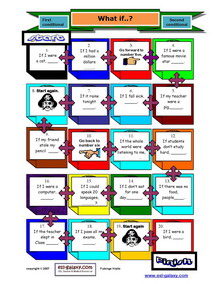

All of what I've explained so far has to do with using conditionals in a real situation as you can see, the whole situations informs our choice of a conditional.Ģ) In English class or on exams, a well-written question should make the context clear enough.

We see it as much more likely that his friends visit: 'If he keeps his house clean, his friends will visit'. If we spoke about his situation now, a first conditional would be more appropriate because the situation is different. And in fact we and a couple of his friends even helped him clean it one weekend and now all he has to do is maintain it. Now imagine the same situation with one difference: Charlie has made a resolution to keep his house clean. In this case, we're thinking about his present situation, as well as his future, and so your second sentence would make the most sense because we view any change to his situation as unlikely. We've known him for several years and know that he wishes his friends would visit him more often. Imagine that our colleague Charlie is very messy and no one wants to visit his house. The first one is for when you're using English to communicate in an authentic situation and the second one is more for the English classroom or exams.ġ) In real life, the conditional we use expresses our perspective. If she was prime minister, she would invest more money in schools.ĭo this exercise to test your grammar again. However, it is also common to hear these structures with was, especially in the he/ she form. When if is followed by the verb be, it is grammatically correct to say if I were, if he were, if she were and if it were. The structure is usually: if + past simple > + would + infinitive. If I won a lot of money, I'd buy a big house in the country. The second conditional is used to imagine present or future situations that are impossible or unlikely in reality. You can go to the party, as long as you're back by midnight. I'll give you a key in case I'm not at home. I don't want to stay in London unless I get a well-paid job. I'll leave as soon as the babysitter arrives. It is also common to use this structure with unless, as long as, as soon as or in case instead of if. In first conditional sentences, the structure is usually: if/ when + present simple > will + infinitive. If it doesn't rain tomorrow, we'll go to the beach.Īrsenal will be top of the league if they win. We use the first conditional when we talk about future situations we believe are real or possible. The structure is: if/w hen + present simple > present simple. If I drink too much coffee, I can't sleep at night. We use the zero conditional to talk about things that are generally true, especially for laws and rules. You will pass your exams if you study hard.Ĭonditional sentences are often divided into different types. If you study hard, you will pass your exams. The if clause tells you the condition ( If you study hard) and the main clause tells you the result ( you will pass your exams). The order of the clauses does not change the meaning. Grammar explanationĬonditionals describe the result of a certain condition. If I lived closer to the cinema, I would go more often.

You're going to open a cake shop? Well, if these cakes, a fortune!.If out every night, so tired all the time. They are hoping to move to the country.They want a dog, but they live in a little house in London.He loves being a teacher, but if a doctor, more money.Use the words given in the correct tense to complete the sentences. (he, not, eat)įor each pair of sentences below, one could be a future possibility, and the other a present/future imaginary situation. He's vegetarian, so if I made him lasagne, it.If on the moon, I don't know what I would eat.If we bought her a pet dog, do you think after it? (she, look).If you, he wouldn't keep buying you presents.If a wallet, would you keep it? (you, find).Practice 1: making second conditionalsĬomplete these sentences with the past simple or would + verb.


 0 kommentar(er)
0 kommentar(er)
